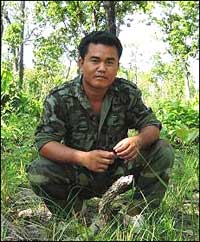Prize winner vows to make Cambodia landmine-free
A winner of the Manhae Peace Prize said his de-mining project will continue until his fellow Cambodians have safe land to cultivate crops and build houses.
“If I clear landmines, village people can use (the land) to build houses and to plant crops. (I want) to make land for them to use safely,” said Ra Aki wearing a camouflage jacket during an interview with The Korea Times, Sunday.
He received the prize Sunday. The 16th Manhae Grand Prize, conferred by the Manhae Foundation, gives prizes in categories of peace, social service, academic excellence, art, literature and missionary work.
The foundation was established to commemorate the work of Ven. Han Yong-un, a Buddhist monk, who devoted himself to the national independence and education movement during Japan’s colonial rule of Korea.
Until 2011, Aki’s team has cleared approximately 1 square kilometers and that has provided work for 10,000 people on the farm.
Lee Sang-ki, a member of the jury who chose Aki as a winner, said his dedication to bringing change to people’s lives around him was highly recognized.
Aki is the founder of Cambodian Self-Help Demining, an NGO established in 1997, and a landmine museum in Siem Reap where he now shelters 38 children who have been injured or lost their parents due to landmine detonations.
Aki is himself a victim. At the age of five, he was taken from his family and raised in a Khmer Rouge village. He does not remember his birthday, except that he was born in 1970, as he later discovered from his uncle and aunt. The name Aki Ra was given by a Japanese
friend.
The Khmer Rouge is known for its harsh treatment of the people and mass killings in Cambodia during its time in power between 1975 and 1979.
At 10, he was given landmines to bury randomly in the countryside. He said he didn’t have any sense of judgment until “I saw his friend and an animal killed.”
He was captured by the Vietnamese army when he was 13, and fought alongside it until the Vietnamese left Cambodia. He was then forced to join the Cambodian army until the United Nations arrived. He learned to clear landmines from the U.N., which left in 1995, but continued the work.
He feels a sense of responsibility. “I have to change bad things I have done in the past.”
Aki works with 30 colleagues. It’s hard to tell how many landmines have been removed, and how many are left. He said a rough estimate is there are between 4-5 million landmines remaining.
In 2010, his work was recognized by CNN.
The demining project and the museum are funded by financial assistance from abroad and the proceeds from the museum.
William W. Morse, a fundraiser for Aki’s projects, expressed concern for the decrease in revenue from the museum.
“Visitors are mostly from Europe,” which is affected by a deepening debt crisis. Morse said the organization welcomes donations, with information available at www.Landmine-Relief-Fund.com.
Asked about his future plans Aki answered, “When my country is done, I want to bring my team to another country to clear (landmines), if they need help.” <The Korea Times/Kim Se-jeong>



























































